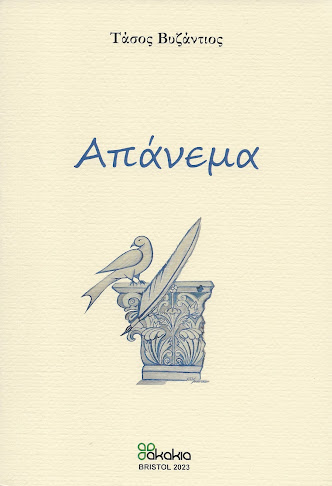Ο Οργανισμός Anglo-Hellenic League, με την χορηγεία της Εθνικής Τράπεζας της Ελλάδας οργανώνει απόψε στις 7.00 μ.μ., στη Μεγάλη Αίθουσα Εκδηλώσεων του Ελληνικού Κέντρου Λονδίνου (16-18 Paddington Street, London W1U 5AS), την Τελετή Απονομής του φετινού Βραβείου Ράνσιμαν.
Υποψήφιοι για το Βραβείο, που συνοδεύεται από το χρηματικό ποσό των £9000, είναι οι παρακάτω:
- D.W. Graham, The Texts of Early Greek Philosophy
- Molly Greene, Catholic Pirates and Greek Merchants
- Emily Greenwood, Afro-Greeks: Dialogues Between Anglophone Caribbean Literature and Classics in the 20th century

- Edith Hall, Greek Tragedy: Suffering under the Sun
- Myrna Kostash, The Prodigal Daughter: A Journey to Byzantium
- Jeremy McInerney, The Cattle of the Sun
- Gonda Van Steen, Liberating Hellenism from the Ottoman Empire
The Runciman Award, first conceived in 1983 during Lord Jellicoe’s chairmanship of the Anglo-Hellenic League, was presented for the first time in 1986 and named in honour of Sir Steven Runciman, the eminent Byzantine scholar and the League’s longest serving Chairman. It is given each year for a work wholly or mainly about some aspect of Greece or the world of Hellenism, published in English in its first edition in the previous year. The aim of the Award is to stimulate interest in Greek history and culture from earliest times to the present; to reward and encourage good and accessible writing, of which Sir Steven’s works are an example; and to promote wider knowledge and understanding of Greece’s contribution to civilization and values. The Judges will have these aims in mind, giving due weight to the criterion of increasing understanding of Greece’s contribution to civilization. No category of writing will be excluded from consideration. Thus, for example, the prize may be awarded for a work in the field of history, literary studies, biography, travel and topography, the arts, architecture, archaeology, the environment, social and political sciences or current affairs; or for a work of fiction, poetry or drama. Works in translation, with the exception of translations from Greek literature, will not be considered.
Υποψήφιοι για το Βραβείο, που συνοδεύεται από το χρηματικό ποσό των £9000, είναι οι παρακάτω:
- D.W. Graham, The Texts of Early Greek Philosophy
- Molly Greene, Catholic Pirates and Greek Merchants
- Emily Greenwood, Afro-Greeks: Dialogues Between Anglophone Caribbean Literature and Classics in the 20th century

- Edith Hall, Greek Tragedy: Suffering under the Sun
- Myrna Kostash, The Prodigal Daughter: A Journey to Byzantium
- Jeremy McInerney, The Cattle of the Sun
- Gonda Van Steen, Liberating Hellenism from the Ottoman Empire
The Runciman Award, first conceived in 1983 during Lord Jellicoe’s chairmanship of the Anglo-Hellenic League, was presented for the first time in 1986 and named in honour of Sir Steven Runciman, the eminent Byzantine scholar and the League’s longest serving Chairman. It is given each year for a work wholly or mainly about some aspect of Greece or the world of Hellenism, published in English in its first edition in the previous year. The aim of the Award is to stimulate interest in Greek history and culture from earliest times to the present; to reward and encourage good and accessible writing, of which Sir Steven’s works are an example; and to promote wider knowledge and understanding of Greece’s contribution to civilization and values. The Judges will have these aims in mind, giving due weight to the criterion of increasing understanding of Greece’s contribution to civilization. No category of writing will be excluded from consideration. Thus, for example, the prize may be awarded for a work in the field of history, literary studies, biography, travel and topography, the arts, architecture, archaeology, the environment, social and political sciences or current affairs; or for a work of fiction, poetry or drama. Works in translation, with the exception of translations from Greek literature, will not be considered.








































.png)

1 comment:
Να πούμε "Ευτυχώς που υπάρχουν και οι (εκάστοτε) φιλέλληνες"; Άξιοι άνθρωποι, που τιμούν την Ελλάδα ως ιστορική προσφορά και παρουσία, χωρίς να μένουν στις μικρότητες των εκάστοτε Ελλήνων. Τους ευχαριστούμε.
Post a Comment